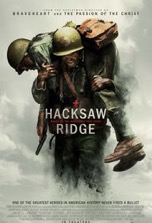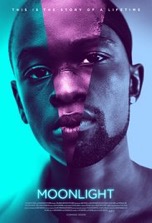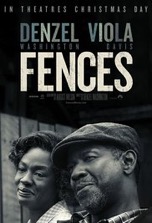March 2017
Hacksaw Ridge (R)
27/03/17 01:03 Filed in: 2016

Starring: Andrew Garfield
November 2016
What follows is the full-length review based on comments that were originally tweeted in Real-time from the back row of a movie theater @BackRoweReviews. Though efforts were made to tease rather than ruin this movie’s memorable lines and moments, some spoilers may exist in the following evaluation. For concerns over objectionable content, please first refer to one of the many parental movie guide websites. Ratings are based on a four star system. Happy reading!
There are a number of similarities between Mel Gibson’s new World War II story, Hacksaw Ridge and the WWI set Sergeant York (1941). Hacksaw’s Desmond Doss (Andrew Garfield) and York’s Alvin C. York (Gary Cooper) are both devout Christians and conscientious objectors. Due to the sixth commandment in the Bible, both men object to war since war is killing. Both men face heat for their beliefs from their families, friends, fellow soldiers and commanding officers. However, the persecution is much more severe for Doss, who is berated and beaten by the men in his barracks for his refusal to bear arms. Ultimately, both men join the service, but for completely different reasons: Doss, who wants to heal people rather than kill them, becomes a medic while York, an expert marksman known for blasting his initials in trees and winning a local turkey shooting contest, decides to use his skills to protect the lives of his loved ones and to defend American freedom. The heroic actions of both men defy the conventions of reality and are two of the more inspirational stories in the annals of war. And both stories have been adapted into top-tier films. Hacksaw’s narrative is divided into thirds: the early stages are dedicated to Doss’s boyhood, where he roughhouses with his brother and is raised by a long-suffering mother, Bertha Doss (Rachel Griffiths), and ex-soldier alcoholic father, Tom Doss (Hugo Weaving), and his late teen years when he meets and marries Dorothy Schutte (Teresa Palmer). The middle of the film deals with the adversity Doss faces at boot camp and the ensuing court martial. The movie’s concluding chapters focus on Doss’s exploits in the war, specifically the Battle of Okinawa in 1945, one of the bloodiest struggles of WWII. During lulls in the action, Doss crawled over the corpse-riddled battlefield searching for survivors while evading Japanese patrols whose objective it was to kill any American soldiers still clinging to life. Doss devised an ingenious way of lowering casualties down the side of a cliff to safety—easily the most awe-inspiring, heart-stopping sequences in the film. In the end, Doss saved 75 lives without firing a single shot at the enemy. As such, Doss was the first ever non-combatant soldier to receive the Medal of Honor. Garfield is pitch-perfect in his portrayal of Doss; his flat affect and aw-shucks demeanor hasn’t been a natural fit for many of his roles, i.e., The Amazing Spider-Man films, but works wonders here. Weaving, best known for his roles in The Matrix and The Lord of the Rings films, paints a tragic portrait of a once-heroic man now controlled and triggered by the bottle. Vince Vaughn is a laugh-a-minute drill sergeant who injects some much needed comic relief into the story to counterbalance the movie’s horrific and grisly scenes. Griffiths is effective in an ancillary role and Palmer is delightful as the sweetheart nurse who first inspires Doss to become a healer. Sam Worthington plays one of Doss’ superior officers, Captain Jack Glover, a man who initially distrusts Doss but comes around when Doss heroically sacrifices himself for his squad mates. The biggest name in the film, of course, is director Mel Gibson. Gibson’s anti-Semitic remarks and longstanding troubles with alcohol have kept him on the outs with Hollywood for the better part of a decade now. Tom Doss’ character reflects some of Gibson’s struggles, so you can tell that this project was personal for the director. Those who are turned off by the non-stop action of the typical war film will find plenty of character scenes to offset the onslaught of action in the latter stages of the film. At its core, this is an anti-war war film. Hacksaw boasts fine performances, tremendous production values and an incredible true story. Just as Doss’ acts of valor redeemed him in the eyes of his fellow soldiers, hopefully Gibson’s efforts here will help him to regain a measure of respect from his Hollywood peers. We’ll see come awards season.
Moonlight (R)
27/03/17 00:30 Filed in: 2016

Starring: Mahershala Ali
November 2016
What follows is the full-length review based on comments that were originally tweeted in Real-time from the back row of a movie theater @BackRoweReviews. Though efforts were made to tease rather than ruin this movie’s memorable lines and moments, some spoilers may exist in the following evaluation. For concerns over objectionable content, please first refer to one of the many parental movie guide websites. Ratings are based on a four star system. Happy reading!
Told in a Boyhood (2014) style, multi-decade storyline, Moonlight follows nine-year-old Chiron (Alex Hibbert) through his tumultuous teenage years (Ashton Sanders) and into his early adulthood (Trevante Rhodes). Chiron’s life is shaped by his home environment growing up; his mother Paula (Naomie Harris) is strung out on drugs most of the time and his self-appointed mentor Juan (Mahershala Ali) is a drug dealer who, ironically, sells drugs to his mother. Since drugs have been such a big part of his life, Chiron chooses the only thing he’s ever known as an occupation: as a successful drug dealer, Chiron becomes the same kind of soulless monster that kept his mother sick and broke. Gender confusion plagues Chiron during his formative years but he eventually discovers that he’s gay, something others have known all along and have teased him about since he was a kid. Chiron tries to hook up with Kevin (Andre Holland), a friend he had created a memory with on a beach (under the moonlight) one night when they were teens. Kevin, who was recently released from jail, has a wife and kid and is happier than he’s ever been. So why would Kevin risk that hard-fought happiness on a one-night stand with Chiron? He wouldn’t. Yet, that’s how the movie ends…on a completely farcical note. Faulty motivations and gaps in logic like these adversely affect the film; an indie pic that, despite delivering a compelling character study, is a drab, glum and relentlessly bleak vision of growing up in our nation’s inner cities. The movie’s performances are excellent throughout, especially Harris and Ali. Harris’ portrayal of a mother addicted to sex and drugs is deeply disturbing but also startlingly realistic. Even though director Barry Jenkins makes the most of limited locations—shot in and around Miami, FL—the movie still ends up looking low budget. Moonlight’s unflinching examination of the exigencies of life in one impoverished region of the U.S. makes for a searingly poignant tale, if not an enjoyable entertainment. Authentic characterizations and graphic, gritty story notwithstanding, it’s hard to see how this film was nominated for a Best Picture Oscar with other more deserving films, like Sully and Allied, waiting in the wings. Coming off a polarizing election season and last year’s racially charged Oscar’s ceremony, Moonlight’s inclusion among the elite films for 2016 seems like a makeup call. After all, the Academy is nothing if not political.
Lion (PG-13)
12/03/17 01:50 Filed in: 2016

Starring: Dev Patel
January 2017
What follows is the full-length review based on comments that were originally tweeted in Real-time from the back row of a movie theater @BackRoweReviews. Though efforts were made to tease rather than ruin this movie’s memorable lines and moments, some spoilers may exist in the following evaluation. For concerns over objectionable content, please first refer to one of the many parental movie guide websites. Ratings are based on a four star system. Happy reading!
What could be more frightening for a five-year-old boy than being separated from his family and not knowing how to get home? Such is the premise for Lion, the alternatingly heartbreaking and heartwarming missing person’s story which is based on true events and stars Dev Patel, Rooney Mara, David Wenham and Nicole Kidman. The story begins in India, moves to Australia in the middle and then returns to India for its stirring conclusion. The film’s exotic locations (which include West Bengal, India and Tasmania, Australia) are absolutely breathtaking and are wholly immersive—it’s almost as if we can feel the pebbles under characters’ sandals as they walk on gravelly paths, or get a chill from the cold, hard train station floor as Saroo (Sunny Pawar) sleeps alongside other indigent kids, or taste the sweet flavor of the bubbly orange soda offered to Saroo by a seemingly helpful woman. Though the film certainly engages the senses it also stimulates the mind and accesses the emotions in powerful and profound ways. The early stages of the movie detail the traumatic events of Saroo’s separation from his family, the hair-raising episode where he narrowly avoids being sold as a sex slave, the brief passage where he is taken to an orphanage and then finally, the life altering transition and subsequent ambivalent reaction to being adopted by a couple (Wenham and Kidman) from Australia. After a few scenes depicting his difficulties adapting to a new family and culture, we jump forward twenty years in Saroo’s (Patel) life to 2008, where he now speaks English and is a reasonably well-adjusted adult. A chance encounter at a party brings Saroo and Lucy (Kate Mara) together and they fall madly in love. After learning about Saroo’s tragic past, Lucy introduces Saroo to a new computer application named Google Earth. With the assistance of the program’s aerial and topographical features, Saroo starts to reconstruct the ill-fated journey that took him away from his loved ones with the hopes of being able to identify his hometown. However, Lucy soon realizes that she’s created a monster when Saroo’s obsession with finding his family consumes his every waking moment and strains their relationship to the breaking point. Revealing the movie’s ending would be a tremendous disservice, but suffice it to say, Lion contains a powerhouse payoff that satisfies without being overly sentimental. The performances are pitch-perfect across the board, especially Patel (Slumdog Millionaire), who is emerging as a tremendous A-list talent. The soundtrack by Volker Bertelmann and Dustin O’Halloran is also very good and contains an eclectic mix of Indian flavored tunes along with beautifully intimate piano pieces. I always get a rush of elation when a movie’s meaning is preserved to the very end, like Citizen Kane’s “Rosebud.” The explanation of the movie’s title here is a tremendous emotional kicker. Be sure to stay through the ending credits for footage of the real Saroo, who wrote the book “A Long Way Home,” which was adapted for the big screen by Luke Davies. Most movies leave audiences feeling thrilled, haunted, entertained, challenged or, at best, inspired. Lion leaves its audience feeling transformed. This isn’t merely a physical or emotional journey…it’s a spiritual one. So, if you’re ready to take the trip of a lifetime, jump aboard. When I say this movie will change your life, I’m not Lion.
Fences (PG-13)
10/03/17 23:37 Filed in: 2016

Starring: Denzel Washington
December 2016
What follows is the full-length review based on comments that were originally tweeted in Real-time from the back row of a movie theater @BackRoweReviews. Though efforts were made to tease rather than ruin this movie’s memorable lines and moments, some spoilers may exist in the following evaluation. For concerns over objectionable content, please first refer to one of the many parental movie guide websites. Ratings are based on a four star system. Happy reading!
“Some people build fences to keep people out, and other people build fences to keep people in.” That line, delivered by Troy Maxson’s (Denzel Washington) best friend, Jim Bono (Stephen Henderson), is the crux of the new stage-to-screen drama, Fences. Indeed, the entire narrative is an extended metaphor for the titular boundary and we rarely ever leave the Maxson property—one scene takes the action out into the street and it just feels awkward, like at any moment an ankle bracelet will start beeping, indicating that we’ve roamed too far from the house. Some individuals are admitted inside Troy’s home and others aren’t. Troy’s wife Rose (Viola Davis) is always welcomed into his home…and bedroom. His stepsons, Lyons (Russell Hornsby) and Cory (Jovan Adepo), are little more than mouths to feed to Troy (especially Lyons, who shows up every payday looking for a handout), and are tolerated more than accepted in Troy’s house. By contrast, Troy’s mentally challenged brother, Gabe (Mykelti Williamson), can waltz right into the house and grab something out of the refrigerator—ironically, an earlier scene shows Rose shooing Cory away from the very same fridge. The relationship between Troy and Gabe is similar, yet thankfully less tragic, than that of George and Lennie in John Steinbeck’s Of Mice and Men. Bono is always warmly received into Troy’s home, but is quick to vacate the premises whenever Troy gets sauced and launches into an anger-filled rant. Sadly, Troy goes outside of his fences for pleasure and brings a lovechild inside the walls of his house. One of the story’s ironies is that Troy raises Rose’s two sons from a previous marriage, but she raises his daughter from another woman. The ramifications of Troy’s extra-marital affair is that he is no longer honored or respected inside his own home by his jilted wife and estranged sons. Troy’s licentious behaviors also place a strain on his friendship with Bono…decisions have consequences. If Troy isn’t drinking or swearing, he’s talking about sports; baseball metaphors are like a second language to him. At one point, when Rose has had enough of Troy’s baseball analogies, she reminds him that this is real life, not baseball. But to Troy, life is baseball. It’s the only thing he ever excelled at, the only thing that ever fulfilled him in life aside from the bottle and his various trysts. An ongoing theme in the film, which is expressed through Troy’s self-pity and regret, is lateness. On several occasions, we’re told that Troy is too late, meaning he’s too old to play in the major leagues, which are finally starting to accept black athletes at this time (the 1950s). Troy might be too old to play professional baseball but he isn’t too old, as Rose is quick to point out, to go off philandering or to sire a child. Although the fence analogy binds the movie’s narrative together, it’s August Wilson’s writing (based on his stage play), Washington’s directing and acting and the superb performances from the entire cast that makes Fences a noteworthy entertainment. Unfortunately, due to its long, chatty scenes, limited locations and claustrophobic settings, the movie never really breaks free from its theatrical moorings. If you can get past its sedentary staginess and its excessive use of the “N” word, Fences is a superb period piece that illuminates the struggles of one mid-century black family. The film is also a microcosm of the exigencies of the human condition—the challenges and successes that define us all, regardless of gender, race, religion or creed. Here’s a thought: Let’s tear down the fences and build bridges instead.